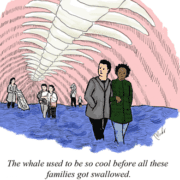originals
Things We Now Know About Whales Since the 1851 Publication of Herman Melville’s Moby Dick
- As the use of whale oil and spermaceti has all but ceased in modern times, whales are now harvested for a different type of oil: cold-pressed organic flaxseed oil, which they’ve stockpiled plenty of.
- The real-life whale known as Mocha Dick that destroyed over 20 whaling boats in the early 19th century and partially inspired Melville’s Moby Dick is now known to have also been the inspiration for L. M. Montgomery’s Anne of Green Gables.
- After the success of the American Cetacean Society’s “Save the Whales” campaign of the 1970s, many similar campaigns in the same spirit have risen since, including: “Save the Sea Turtles,” “Save the Rhino,” and Save the Last Dance, a 2001 teen melodrama film starring Julia Stiles.
- Some whales can live to be over 200 years old, but as whale Social Security is drying up, many are forced to continue working well into their 180s and 190s.
- With the discovery of an advanced intelligence in whales, some have been utilized to assist humans, including by cracking some of New York City’s toughest unsolved sex crimes within the NYPD’s 16th precinct Special Victims Unit.
- Melville’s assertion that the sperm whale is the “largest creature on earth” is now known to be inaccurate. It is actually the blue whale that holds this title. (Unless you happen to be reading this in Tennessee, in which case, state law suggests that neither dinosaurs or whales ever existed.)
- Whale blubber is no longer used to make soaps, leather, and cosmetics, and whales are rarely hunted for meat anymore. (Unless you happen to be reading this in Japan, in which case, whale meat tastes great and fuck off everyone.)
- With the invention of the “whale translator” in 2007, humans can now understand what whale songs are saying. But whales are depressing and only talk about our noisy boat propellers and sharp harpoons, so we’ve stopped listening.
- At least two out of every ten sperm whales have an Italian trade worker, his wooden boy, and a cat named Figaro living inside of them.
- Cetologists suspect that whales are capable of great empathy and can even simulate human emotions, but that they choose not to in order to aggravate the Japanese.
- About the Author
- Latest Posts
Michael A. Ferro’s debut novel, TITLE 13, will be published by Harvard Square Editions in February 2018. He received an Honorable Mention from Glimmer Train for their New Writers Award and he is a contributor to Splitsider and featured writer for Points in Case. Michael’s fiction has appeared in numerous journals in both print and online. Born and bred in Detroit, Michael has lived, worked, and written throughout the Midwest; he currently resides in rural Ann Arbor, Michigan. Additional information can be found at: www.michaelaferro.com and @MichaelFerro.













